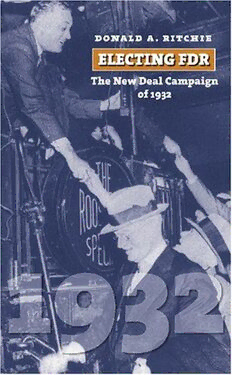
Electing FDR: The New Deal Campaign of 1932 PDF
Preview Electing FDR: The New Deal Campaign of 1932
ELECTING FDR With the landmark election of Franklin Delano Roosevelt in 1932, decades of Republican ascendancy gave way to a half century of Democratic dominance. It was nothing less than a major political realignment, as the direction of federal policy shifted from conservative to liberal—and liberalism itself was redefined in the process. Electing FDR is the first book in seventy years to examine in its entirety the 1932 presidential election that ushered in the New Deal. Award-winning historian Donald Ritchie looks at how candidates responded to the nation’s economic crisis and how voters evaluated their performance. More important, he explains how the Democratic Party rebuilt itself after three successive Republican landslides: where the major shifts in party affiliation took place, what contingencies contributed to FDR’s victory, and why the new coalition persisted as long as it did. Ritchie challenges prevailing assumptions that the Depression made Roosevelt’s election inevitable. He shows that FDR came close to losing the nomination to contenders who might have run to the right of Hoover, and discusses the role of newspapers and radio in presenting the candidates to voters. He also analyzes Roosevelt’s campaign strategies, recounting his attempts to appeal to disaffected voters of all ideological stripes, often by altering his positions to broaden his popularity. \ \ - \. {. t f:-* ' > \ i \ ; l ' V / ■ -X ' ■ / / ELECTING FDR American Presidential Elections MICHAEL NELSON JOHN M. MCCARDELL, JR. ELECTING FDR THE NEW DEAL CAMPAIGN OE I f §2 DONALD A. RITCHIE t UNIVERSITY PRESS OF KANSAS Published © 2007 by the University Press of Kansas by the All rights reserved University Press of Kansas Photographs on pages 66, 83 (Clifford Berryman cartoon), 93,131, (Lawrence, 156,173, and 179 (from the New York World Telegram and Sun) Kansas 66049), are from the Library of Congress; on pages 31, 34, 59,117, and which was 128, from the Hoover Library; on page 128, Clifford Berryman organized by the cartoon from the National Archives and Records Administration; Kansas Board of and on page 174, from the Senate Historical Office. Regents and is operated and Library of Congress Cataloging-in-Publication Data funded by Ritchie, Donald A., 1945- Emporia State Electing FDR : the New Deal campaign of 1932 / University, Donald A. Ritchie. Fort Hays State p. cm. — (American presidential elections) University, Includes bibliographical references and index. Kansas State ISBN 978-0-7006-1550-6 (doth : alk. paper) University, 1. Presidents—United States—Election—1932. 2. Roosevelt, Pittsburg State Franklin D. (Franklin Delano), 1882-1945. 3. Political University, campaigns—United States—History—20th century. 4. United the University States—Politics and government—1929-1933.1. Tide. of Kansas, and E805.R58 2007 Wichita State 973-9I7°92—dc22 2007028024 University British Library Cataloguing-in-Publication Data is available. Printed in the United States of America 10 9 8 7 6 5 4 3 2 1 The paper used in this publication meets the minimum requirements of the American National Standard for Permanence of Paper for Printed Library Materials Z39.48-1984. CONTENTS Editors’ Foreword vii Author’s Preface ix Introduction i The Politics of Prosperity 7 Prefix for Poverty 38 A Couple of Conventions in Chicago 77 A Campaign of Hope and Fear 115 The New Deal Experiment 161 Appendix a: Franklin D. Roosevelt Radio Address Appendix b: Herbert Hoover Radio Address 219 Appendix c: 1932 General Election Results 223 Appendix d: Civilian Employment Statistics, 1929-1945 225 Notes 227 Bibliographic Essay 253 Index 263 E Ai Jo k k os tra ill I* Is Dc & til Ft! IS F; to k th( “I an H Jii inj up OD Di Hi if su 4 cc re editors’ foreword An electoral landslide whose outcome seems inevitable in retrospect does not always seem that way in prospect. In 1864 Abraham Lincoln defeated George McClellan by 212 to 21 electoral votes, but less than three months before the election Lincoln had written, “This morning, as for some days past, it seems exceedingly probable that the Adminis tration will not be reelected.” On the Sunday before the 1980 election almost every political pundit and pollster judged the contest between Jimmy Carter and Ronald Reagan too close to call. Two days later Reagan bested Carter in the Electoral College by 489 to 49. One of renowned U.S. Senate and Washington press corps historian Donald A. Ritchie’s great achievements in Electing FDR: The New Deal Campaign of 1932 is to recapture the suspense and uncertainty that, un til the votes were counted, marked the 1932 election between Governor Franklin D. Roosevelt of New York, the Democratic nominee, and the reelection-seeking Republican president, Herbert Hoover. To be sure, Ritchie does not dispute the sweeping character of the victory won by Roosevelt and his party: a 472-59 majority for FDR in the Electoral Col lege, along with coattails that brought ninety-seven new Democrats to the House of Representatives and twelve to the Senate. In a conclud ing chapter that surveys the transformative character of the New Deal and the lasting partisan realignment ushered in by Roosevelt’s victory, Ritchie also makes a persuasive case that 1932 was an election of extraor dinary and lasting importance. But, oh, the suspense that preceded these outcomes! Roosevelt’s nom ination by the Democratic National Convention was hard-fought and, until the fourth and final ballot, far from certain. “Had his party chosen one of the ‘stop-Roosevelt’ alternative candidates,” Ritchie notes, “the Democratic presidential candidate might well have run to the right of Hoover.” And, Ritchie adds, that is what probably would have happened if A1 Smith, the party’s presidential nominee in 1928, had thrown his support to another candidate instead of remaining aloof in the vain hope that Democrats would turn to him again. Bookmakers at the Democratic convention judged Hoover the five-to-one favorite in November, Ritchie reports. Throughout the campaign, Hoover consistently regarded FDR
